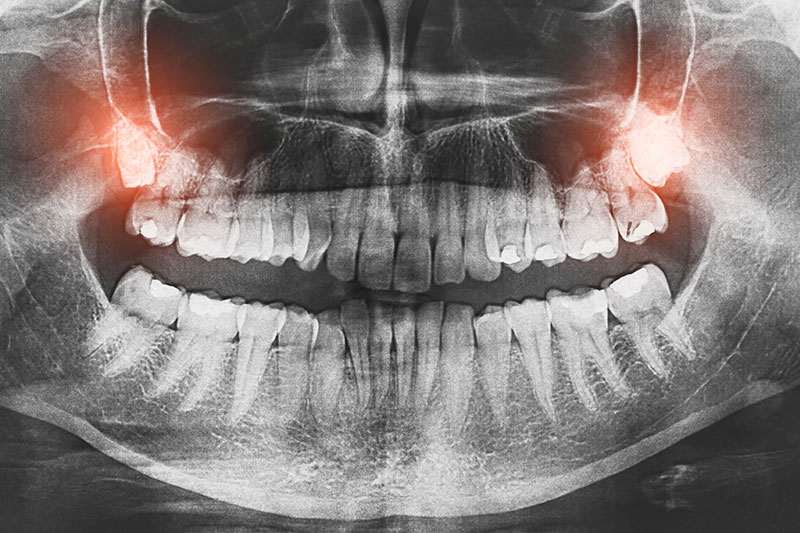
For many patients, wisdom tooth extraction is their first experience with oral surgery. This procedure is quite common because the wisdom teeth are so likely to become impacted in a modern human jaw.
Impacted wisdom teeth must be removed surgically, and patients can take steps to make this process go as smoothly as possible by following our specialist’s directions for both pre-operative and post-operative care.
If you are in your late teens or early twenties and your wisdom teeth have not yet erupted, we encourage you to contact our office and schedule an evaluation.
Why do wisdom teeth become impacted?
In short, our wisdom teeth are prone to get impacted because our jaws have gotten smaller and narrower through the process of human evolution.
The wisdom teeth served important purposes for our ancient human ancestors, helping them process a diet that was much more fibrous than modern foods are and replacing teeth lost to wear and tear.
However, over time, the wisdom teeth became rather obsolete in humans.
Furthermore, impacted wisdom teeth can cause problems like:
- Discomfort
- Damage to surrounding teeth
- Cysts and tumors
- Susceptibility to infection and abscesses
Because we don’t need our wisdom teeth, and they may cause problems for us, many patients opt to have them removed as a preventive measure.
Why do impacted wisdom teeth need to be removed surgically?
The extraction of impacted wisdom teeth requires a surgical procedure because the bone that is blocking the proper eruption of the tooth must be removed before the tooth can be accessed and extracted.
Choosing specialists, like the experienced team at Pinnacle Oral Surgery, is beneficial for patients, as our providers perform this procedure routinely. It is one of the focus areas of our practice.
The timing of wisdom tooth extraction matters, as well. We strongly recommend that patients who want to pursue wisdom tooth extraction do so before they reach their mid-twenties. It is easier to remove the wisdom teeth in younger patients, and they recover more quickly after the procedure.
However, extraction can be considered in older patients in certain scenarios, such as when the wisdom teeth are causing issues.
How can I prepare for wisdom tooth extraction?
The specialists at Pinnacle Oral Surgery want to make sure that you are as prepared as possible for your wisdom tooth extraction, so we will thoroughly review all pre-operative instructions with you prior to your scheduled procedure.
You may receive instructions about brushing and flossing your teeth prior to the procedure or refraining from eating after midnight if you will receive IV sedation. Please don’t hesitate to ask any questions you may have about these instructions.
Additionally, if you will be sedated for the procedure, you will need to make arrangements for a responsible adult to escort you home from the appointment and remain with you until the sedation is completely reversed. It will not be safe for you to drive immediately after the appointment.
How do I care for my smile after wisdom tooth extraction?
Because wisdom teeth removal is a surgical procedure, it is associated with certain risks that are involved with all types of surgery, such as infection. Additionally, patients who have their wisdom teeth extracted can be at risk for dry sockets, which is a painful post-operative complication.
Fortunately, you will be discharged from our office with written instructions on post-operative care that will help you prevent these complications, such as:
- Cleaning the extraction sites properly
- Dietary restrictions for the first few days after extraction
- Avoiding drinking straws
- Avoiding smoking (ideally this will be an opportunity for you to give up this habit completely!)
If there are additional directions specific to your case, your oral surgeon will let you know before you leave the appointment.
FAQs about Wisdom Teeth
It’s not a requirement to have all four wisdom teeth removed at the same time, but many patients choose to do so because it is more convenient to have a single oral surgery procedure. Your oral surgeon will discuss your treatment options with you, including removal of only some of the wisdom teeth, after evaluating your case.
While you do not have to be sedated in order to have your wisdom teeth extracted, many patients feel that choosing sedation gives them maximum comfort during the procedure. We will discuss all of the possible sedation options, including no sedation, with you at your evaluation.
Most patients can return to school or sedentary work within a few days of having their wisdom teeth extracted. If you have a physically demanding job, you will need to give yourself a few more days to heal before going back. Keep in mind that post-extraction complications will derail your recovery, so follow the directions you receive to avoid them.
A dry socket is when the blood clot that is supposed to form after extraction is either dislodged prematurely or doesn’t develop at all. When the protective blood clot isn’t there, the sensitive nerve endings are exposed as the tissue heals. As such, dry sockets are very painful. Fortunately, the risk of this issue can be reduced if the patient adheres to post-operative instructions.
